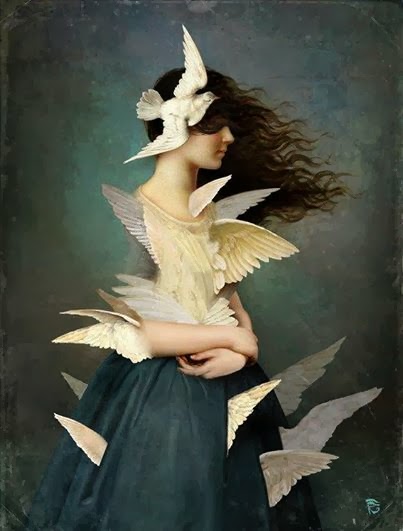This is a good poem. Just to take away the pleasure of finding that out on your own.
It is good in a literary sense, in that uses the language in a self-referring and somewhat hypnotic, rhythmic, rhymeful way. It also uses a well-known fairytale to tell an allegoric and archetypical story of the young naive girl meeting the "world" ("what little girl doesn't dearly love a wolfe") through one of its more rugged representatives. In this case a wolf, disguised as a man. Or the other way around. Thus you could also call it a deeply human poem.
One of the sentences that stands out for me in this poem: "You might ask why. Here's why. Poetry."
Why enter the unknown, that which seems dark and wild, when not knowing where it will lead you? The reason be -- poetry. Because we are here to learn, and thus, put ourselves out for risk.
What I would most like to say is: read this poem!
Little Red Cap
into playing fields, the factory, allotments
kept, like mistresses, by kneeling married men,
the silent railway line, the hermit’s caravan,
till you came at last to the edge of the woods.
It was there that I first clapped eyes on the wolf.
 He stood in a clearing, reading his verse out loud
He stood in a clearing, reading his verse out loud in his wolfy drawl, a paperback in his hairy paw,
red wine staining his bearded jaw. What big ears
he had! What big eyes he had! What teeth!
In the interval, I made quite sure he spotted me,
sweet sixteen, never been, babe, waif, and bought me a drink,
my first. You might ask why. Here’s why. Poetry.
The wolf, I knew, would lead me deep into the woods,
away from home, to a dark tangled thorny place
lit by the eyes of owls. I crawled in his wake,
my stockings ripped to shreds, scraps of red from my blazer
snagged on twig and branch, murder clues. I lost both shoes
but got there, wolf’s lair, better beware. Lesson one that night,
breath of the wolf in my ear, was the love poem.
I clung till dawn to his thrashing fur, for
what little girl doesn’t dearly love a wolf?
Then I slid from between his heavy matted paws
and went in search of a living bird – white dove –
which flew, straight, from my hands to his hope mouth.
One bite, dead. How nice, breakfast in bed, he said,
licking his chops. As soon as he slept, I crept to the back
of the lair, where a whole wall was crimson, gold, aglow with books.
Words, words were truly alive on the tongue, in the head,
warm, beating, frantic, winged; music and blood.
But then I was young – and it took ten years
in the woods to tell that a mushroom
stoppers the mouth of a buried corpse, that birds
are the uttered thought of trees, that a greying wolf
howls the same old song at the moon, year in, year out,
season after season, same rhyme, same reason. I took an axe
to a willow to see how it wept. I took an axe to a salmon
to see how it leapt. I took an axe to the wolf
as he slept, one chop, scrotum to throat, and saw
the glistening, virgin white of my grandmother’s bones.
I filled his old belly with stones. I stitched him up.
Out of the forest I come with my flowers, singing, all alone.
~ Carol Ann Duffy, 1999, from The World's Wife









